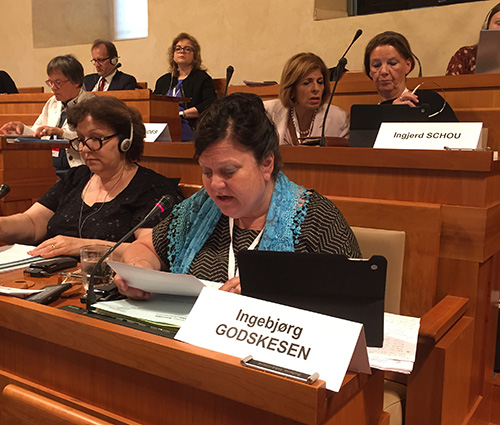PACE appoints corruption investigators
The Bureau of the Parliamentary Assembly of the Council of Europe (PACE) and the PACE Standing Committee met in Prague on 29 May and 30 May. The meetings focused on establishing an external independent corruption investigation.

Delegation leader Ingjerd Schou (Conservative Party) and delegation member Ingebjørg Godskesen (Progress Party). Photo: Storting.
The Czech Republic recently assumed the presidency of the Council of Europe’s Committee of Ministers and served as host. From the Storting, delegation leader Ingjerd Schou (Conservative Party) and delegation member Ingebjørg Godskesen (Progress Party) participated.
Corruption investigation
At issue in the meetings were the corruption allegations against the assembly and the work of establishing an external independent investigation. Since January Ms Schou and the Norwegian delegation have worked actively to have the allegations investigated and to anchor the investigation in a strong mandate, with independence from the assembly as a basic principle. The mandate was adopted during the April session and a list of possible investigators was finalised in advance of the meetings in Prague.
The bureau agreed yesterday that the three members of the investigative body would be Sir Nicolas Bratza (former President of the European Court of Human Rights in Strasbourg, from the UK), Jean-Louis Bruguière (a former judge with experience in anti-terrorism cases, from France) and Elisabeth Fura (a former judge at the European Court of Human Rights in Strasbourg, from Sweden). The investigation will begin after the Parliamentary Assembly confirms the members at its plenary session during the last week in June.
“For the Norwegian delegation it is important that the corruption allegations be taken seriously and I am very pleased that it’s now clear who will be responsible for the investigation. They have a difficult and important task in front of them. The allegations of corruption undermine the integrity not only of the Parliamentary Assembly but of the Council of Europe as well,” Ms Schou said after the Prague meetings.
Serbia
During the meeting of the Standing Committee, Ingebjørg Godskesen presented her report after having led PACE’s election observation mission to Serbia in connection with the presidential election there in April. The Serbian delegation criticized a statement in the report that the country’s sitting president, who won re-election, had received far more TV broadcast time during the campaign period than all the other candidates combined. The criticism was not accepted and the report was adopted without change.
Council of Europe and Parliamentary Assembly
The Council of Europe was established in 1949 and currently has 47 member countries. The main purpose of the Council of Europe is to strengthen human rights, democracy and the rule of law in the member states.
The Parliamentary Assembly of the Council of Europe (PACE) consists of representatives of the national assemblies of the member states, and has 324 members (and 324 substitutes) in all. The assembly has an advisory function and plays a significant role in the Council of Europe. It adopts resolutions and recommendations to member state parliaments and governments in a number of subject areas, and it monitors the compliance of new member states with their membership commitments.
Last updated: 21.06.2017 14:18